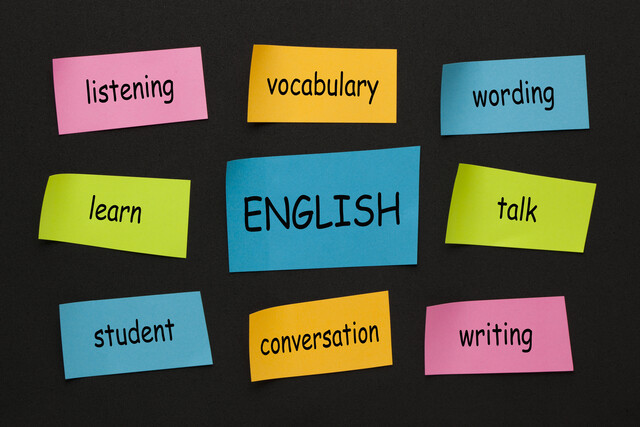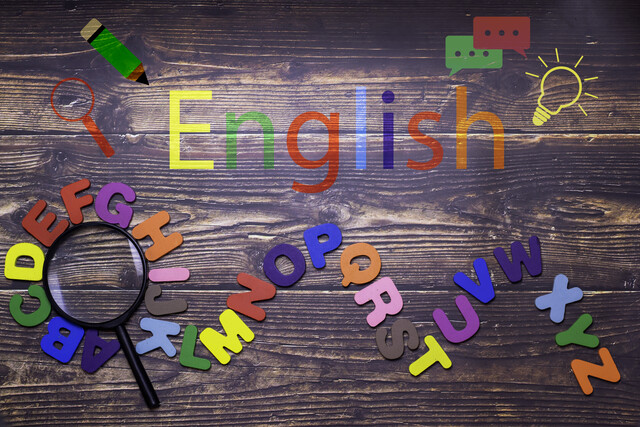Online Class: ESL Grammar Skills Level 1

no certificate
with CEU Certificate*
-
32Lessons
-
83Exams &
Assignments -
4,116Students
have taken this course -
12Hours
average time -
1.2CEUs
Course Description
ESL Grammar Skills Mastery: Embark on Your English Journey with Level 1
Embarking on the adventure of mastering a new language, especially English, is both exhilarating and challenging. Tailored precisely for those taking their initial steps in this voyage, our 'ESL Grammar Skills Level 1' is the perfect starting point. Crafted meticulously for English as a Second Language (ESL) learners, this course ensures that every nuance, every rule, is presented in a manner that resonates with your unique learning journey.
At Level 1, we lay down the foundational bricks of English grammar. Delve deep into the world of tenses, specifically focusing on the intricacies of present simple and past simple. From there, we'll guide you through the captivating realm of verbs, spotlighting their diverse forms and functions.
Here's a peek into our holistic course offerings:
- Dancing with Verbs: Unearth the magic of verbs, including the dynamic '-ing' form, and unravel the peculiarities of 'be' verbs, distinguishing them from their counterparts.
- Nouns & More: Dive into plurals, discern the significance of articles 'a' and 'an', and embrace the art of using adjectives to paint vivid linguistic pictures.
- Pronouns & Demonstratives: Master subject pronouns, possessive adjectives, and the subtle nuances of using 'this/that/these/those'.
- Prepositions & Beyond: Decode the world of prepositions, especially those defining place and time, while also tackling the essential 'wh-' questions and understanding the frequency-driven adverbs.
- Sentence Structuring: Craft simple (S-V-O) and compound sentences, ensuring your thoughts flow smoothly in English.
- Irregularities in English: Navigate the fascinating domain of irregular spellings, plurals, gerunds, and verb formations.
Beyond grammar, we infuse our course with a comprehensive writing component. With 33 enriching lessons, each supplemented with vivid illustrations, exhaustive exercises, and section-specific exams, the journey becomes as immersive as it is instructive. Moreover, we've incorporated state-of-the-art audio-visual aids, including High-Definition videos for every lesson. These videos serve a dual purpose: enhancing your understanding and fine-tuning your listening comprehension and pronunciation.
By the culmination of this course, you'll have forged a sturdy foundation in English. While the linguistic expanse you'll navigate may be foundational, it'll empower you to articulate the majority of your thoughts and ideas. So, whether you're just starting your English journey or seeking to rejuvenate your foundational skills, our Level 1 offering stands as an invaluable resource.
Dive in, and let's co-create your English story, one grammatical rule at a time!
- Completely Online
- Self-Paced
- 6 Months to Complete
- 24/7 Availability
- Start Anytime
- PC & Mac Compatible
- Android & iOS Friendly
- Accredited CEUs

Course Lessons
Lesson 1. Mastering Subject Pronouns: A Foundational Guide
Interactive exercises guide learners in mastering the use of subject pronouns through dedicated practice sessions that emphasize repetition. The cycle of practice and starting over aims to solidify comprehension.Lesson 2. Building Blocks of English Sentences: Subject, Verb, and Object
Sentence structure in English is defined by the order: subject-verb-object; however, some verbs require a complement instead of an object, which can be an adjective or a prepositional phrase. To construct sentences correctly, remember that every sentence needs a subject and a verb, but the object depends on the verb type.Lesson 3. Third Person Singular: The Verb 'Be' in Action
Learners explore sentence construction using the present simple verb 'be,' while exercises focus on adjective-noun agreement and prepositional context, with sentence rewrites like 'Jeremy's a plumber.' Lists provided aim to expand vocabulary through descriptive language and practical noun usage.Lesson 4. Crafting Sentences: Adjectives and Nouns Combined
In this lesson, students enhance their English syntax skills by reordering jumbled phrases to construct sentences, ensuring adjectives come before nouns. It stresses proper sentence formatting via uppercase beginnings and period endings, cultivating disciplined writing behavior.Lesson 5. Mastering 'Was' and 'Wasn't' with He, She, It
Learners practice converting present simple sentences into past simple form using 'was' or 'wasn't,' aiding them in expressing temporal information accurately for third-person singular subjects. Exercises include creating positive and negative past statements, as well as forming relevant questions to reinforce understanding.Lesson 6. Exploring Prepositions: Spatial Relationships with In, On, Under, and More
This lesson focuses on using prepositions to describe spatial relationships, utilizing examples like 'The star is under the square' and encouraging learners to practice with variations.Lesson 7. Navigating Adjectives, Nouns, and Prepositional Phrases with 'Be'
This lesson delves into how 'be' verbs function with different types of words in English sentences, maintaining the same structure whether they describe singular or plural subjects. Exercises are provided to reinforce mastery, focusing on both full and contracted forms.Lesson 8. Grammar in Action: Using Possessive Adjectives
Lesson 8 focuses on possessive adjectives matched with subject pronouns, illustrating examples like 'my dog' and 'their house.' The lesson includes exercises to practice using possessive adjectives and correcting grammatical errors in sentences.Lesson 9. Understanding Articles: A and An in English Grammar
This session clarifies the use of 'a' vs 'an' by examining initial sounds, offering rules and exceptions for perfect article usage. Exercises help solidify understanding of choosing the correct article in various grammatical contexts.Lesson 10. Understanding English Plurals: Formation and Rules
In English, pluralization primarily affects nouns by adding an -s, with some exceptions requiring -es for extra phonetic clarity.Lesson 11. Understanding When to Use -s: Present Simple Verbs for He/She/It
Lesson 11 explains the formation of present simple verbs in the third person singular for actions performed by 'he,' 'she,' or 'it,' emphasizing habitual actions. It distinguishes between verbs that require objects, those that require complements, and some that can use either, explaining the importance of learning these distinctions for effective communication.Lesson 12. Present Simple: Building Strong Foundations
Lesson 12 covers how to use the present simple tense for all subjects and provides examples with various sentence structures. Students completed exercises requiring sentence construction and verb conjugation, emphasizing third person singular changes.Lesson 13. Exploring Negations and Descriptions: Understanding 'Not' with Mary and Others
The lesson explains the English negation process using 'is not' to alter meanings of adjective and noun predicates. It provides practice sentences where learners convert positive statements into negatives using contractions and full forms.Lesson 14. Exploring Negations in English: From Phrases to Sentences
Lesson 14 teaches the use of 'are not' contractions, highlighting that 'am not' becomes 'I'm not.' An exercise reinforces the lesson by rearranging sentences to use short forms correctly.Lesson 15. Adventures with 'Ago' and the Past Tense
This lesson delineates using 'ago' to construct past tense sentences, distinguishing between affirmative and negative forms. The exercises provided are designed to enable diverse expressions of time and events using structured patterns.Lesson 16. Pairing Sentences with Their Question Twins
Students are tasked with reversing given statements to questions, exemplified by changing 'The dog is in the yard' into 'Is the dog in the yard?'. Accompanying exercises guide learners in providing appropriate positive or negative short responses.Lesson 17. Understanding Wh- Question Words
Understanding English question formation involves using words like what, where, and why to ask for specific details, rather than just yes or no answers. This lesson provides practice in crafting questions and selecting appropriate question words based on the type of information requested.Lesson 18. Playing with Negatives: The 3rd Person Singular Edition
This lesson is centered on teaching negatives in the third person singular, as seen in sentences like Sara doesn't eat pasta, contrasted with what she does eat. The subsequent exercise aids learners in crafting their own sentences by emphasizing what various subjects don't do.Lesson 19. Exploring Third Person Singular Questions: A Comprehensive Guide
Focusing on the third person singular, this lesson guides students in turning declarative sentences into questions, using practical examples. Students enhance their language skills by crafting both questions and opposite forms of given sentences, enriching their grasp of English grammar.Lesson 20. Mastering Negatives and Questions: A Comprehensive Third Person Singular Review
The lesson dives into manipulating sentence structure by transforming affirmatives into negatives and crafting relevant questions, with an emphasis on the third person. Through diverse exercises, students enhance their ability to form questions and negate statements efficiently.Lesson 21. Interrogative Practice: Turning Statements into Questions
The lesson provides exercises on crafting questions from statements and responding using short forms. Guidance is given on when full verb forms are necessary in answers.Lesson 22. Navigating Abilities: Lessons in 'Can' and 'Can't'
The concept of 'can' represents the ability to perform an action without variation across different subjects, always teamed with the simple form of the verb. Negative 'can't' is its straightforward counterpart for expressing actions one is unable to perform, maintaining uniform application for all subjects.Lesson 23. Timeless Tenses: Navigating Regular Verb Past Forms
When conjugating regular verbs into the simple past, the verb endings are crucial; focus on patterns like -ed, with exceptions on doubling consonants or -y to -ied transformation. Enrich sentences by incorporating time phrases to perfectly set the scene in the past.Lesson 24. Irregular Verbs Past Tense
Learning to use irregular verbs involves memorizing specific past tense forms, highlighted by a list of 25 frequent verbs, since they do not adhere to the regular '-ed' pattern. The exercises provided in the lesson are designed for practice in context, solidifying the learner's understanding.Lesson 25. Quick Guide to Irregular Verbs (2)
By listing and practicing with commonly misused irregular verbs, this lesson efficiently builds grammatical competence in their past forms. Engaging exercises direct learners to convert verbs like 'cut,' 'run,' and 'set' into their appropriate past tense versions.Lesson 26. Exploring the Simple Past: Crafting Questions and Negatives
This lesson teaches how to ask and answer questions using the simple past tense by practicing with various scenarios. Students learn to formulate both affirmative and negative sentences from the given prompts.Lesson 27. The Art of Compound Sentence Construction
The lesson explains how compound sentences use coordinating conjunctions to link related or contrasting ideas, enriching simple sentence structures. Notably, the conjunctions 'and' and 'but' are explored through examples and exercises to clarify their usage.Lesson 28. Existence Explained: Understanding 'There is' and 'There are'
The lesson outlines how 'there is' points to a single entity while 'there are' suggests multiplicity, using examples like the Queen of England or the children in a neighborhood. Students practice constructing sentences and inquiries using this pattern as applied to a fictional map.Lesson 29. Demonstratives in English: Mastering This, That, These, and Those
Learn to distinguish proximity and number using 'this,' 'that,' 'these,' and 'those' for both singular and plural references near and far. Additionally, practice applying these terms correctly through exercises involving identifying proper usage in sentences.Lesson 30. Distinguishing Activities: To Play or To Go
When discussing activities with significant motion in English, the structure 'go + [verb + -ing]' is used, such as in 'go swimming' or 'go hiking.' Less action-oriented activities use the structure 'go + [simple verb]' like in 'go play soccer,' and 'go' can be optional in these contexts.Lesson 31. Infinitive Verb Mastery: Unlocking the Power of 'To' with Like, Love, Want, and Need
To correctly follow 'like,' 'love,' 'want,' or 'need,' a verb needs to be in the infinitive form such as 'to learn' or 'to speak.' Determine if 'to' is a preposition or part of an infinitive by checking if the subsequent word is a noun or a verb.Lesson 32. The Role of Frequency Adverbs in English Sentences
Understanding the role of frequency adverbs enhances sentence clarity by specifying how often actions occur, using adjectives like 'never' and 'usually' appropriately. Exercises reinforce concepts by instructing students to rephrase sentences with designated adverbs in the proper position.
Learning Outcomes
- Demonstrate proficiency in writing and speaking subject pronouns through repeated practice.
- Recognize and accurately use subject pronouns based on given images.
- Construct simple sentences using the S-V-O or S-V-C structure appropriately in English.
- Identify and label the subject, verb, and object or complement in a given simple sentence.
- Identify and apply appropriate adjectives, nouns, and prepositional phrases to construct simple sentences in English.
- Recognize and correctly use the third person singular form of the verb 'be' in simple present tense.
- Identify the correct adjective-noun order to construct sentences effectively in English.
- Organize jumbled words into grammatically correct English sentences using adjective-noun pairings.
- Demonstrate the ability to convert present simple sentences to past simple by rewriting given sentences in positive and negative forms using 'was' or 'wasn't.'
- Formulate questions in the simple past tense by constructing accurate question sentences from provided declarative past simple sentences.
- Construct sentences using prepositions to accurately describe spatial relationships between two objects
- Recognize and apply the appropriate preposition to describe the position of objects in relation to each other in given scenarios
- Recognize and correctly use the appropriate form of the 'be' verb in simple sentences with adjectives, nouns, and prepositional phrases.
- Demonstrate mastery of lesson content at levels of 70% or higher.
Additional Course Information

- Document Your Lifelong Learning Achievements
- Earn an Official Certificate Documenting Course Hours and CEUs
- Verify Your Certificate with a Unique Serial Number Online
- View and Share Your Certificate Online or Download/Print as PDF
- Display Your Certificate on Your Resume and Promote Your Achievements Using Social Media

Choose Your Subscription Plan
No Certificate / No CEUs
This course only
| Includes certificate | X |
| Includes CEUs | X |
| Self-paced |

|
| Instructor support |

|
| Time to complete | 6 months |
| No. of courses | 1 course |
Certificate & CEUs
This course only
| Includes certificate |

|
| Includes CEUs |

|
| Self-paced |

|
| Instructor support |

|
| Time to complete | 6 months |
| No. of courses | 1 course |
Certificates & CEUs
Includes all 600+ courses
| Includes certificate |

|
| Includes CEUs |

|
| Self-paced |

|
| Instructor support |

|
| Time to complete | 12 Months |
| No. of courses | 600+ |
Certificates & CEUs
Includes all 600+ courses
| Includes certificate |

|
| Includes CEUs |

|
| Self-paced |

|
| Instructor support |

|
| Time to complete | 24 Months |
| No. of courses | 600+ |
Student Testimonials
- "This course was more than helpful and the lesson materials were extremely easy to understand. I learned all the rules that I needed to feel confident when speaking English. Thank you!" -- Clara D.
- "I really enjoyed the class. The instructor was very prompt in grading each lesson, and she was very helpful." -- Shirley M.
- "I liked the course. The instructor used drawings in some of the lessons to present a clearer picture of what she was trying to get across. I thought this was very original. The material flowed from lesson to lesson in an organized and easy manner. This is an ideal course for someone wishing to learn English, or needing a refresher course on the basics of the English language. I liked that the material was very concise. It wasn't too wordy." -- Toni B.
- "Very good." -- Yakelis D.
- "I was really amazed by the presentation chart of percentage of time to use adverb between Noun and Verb." -- Abdool H.
- "All of it was helpful." -- James E.
- "I enjoyed all parts of this course. All information in every lesson was so helpful." -- Natalija S.
Related Courses
-
 72 hours
7.2 CEUs
Writing Help Course Bundle
+ More Info
72 hours
7.2 CEUs
Writing Help Course Bundle
+ More Info
-
 52 hours
5.2 CEUs
ESL Grammar Skills: Level 1-5 Course Bundle
+ More Info
52 hours
5.2 CEUs
ESL Grammar Skills: Level 1-5 Course Bundle
+ More Info
-
 17 hours
1.7 CEUs
ESL Basic Grammar and Writing
+ More Info
17 hours
1.7 CEUs
ESL Basic Grammar and Writing
+ More Info
-
 12 hours
1.2 CEUs
How to Write Case Studies
+ More Info
12 hours
1.2 CEUs
How to Write Case Studies
+ More Info
-
 11 hours
1.1 CEUs
Writing Effective Emails in the Workplace
+ More Info
11 hours
1.1 CEUs
Writing Effective Emails in the Workplace
+ More Info
-
 8 hours
0.8 CEUs
Teaching Grammar to ESL Students
+ More Info
8 hours
0.8 CEUs
Teaching Grammar to ESL Students
+ More Info
-
 7 hours
0.7 CEUs
Basic English Speaking Skills
+ More Info
7 hours
0.7 CEUs
Basic English Speaking Skills
+ More Info
-
 14 hours
1.4 CEUs
Report Writing 101
+ More Info
14 hours
1.4 CEUs
Report Writing 101
+ More Info
-
 3 hours
0.3 CEUs
Understanding Learning Styles
+ More Info
3 hours
0.3 CEUs
Understanding Learning Styles
+ More Info
-
 6 hours
0.6 CEUs
ESL Basic Grammar
+ More Info
6 hours
0.6 CEUs
ESL Basic Grammar
+ More Info
-
 11 hours
1.1 CEUs
Journaling and Memoir Writing
+ More Info
11 hours
1.1 CEUs
Journaling and Memoir Writing
+ More Info
-
 11 hours
1.1 CEUs
ESL Basic Writing Skills
+ More Info
11 hours
1.1 CEUs
ESL Basic Writing Skills
+ More Info





